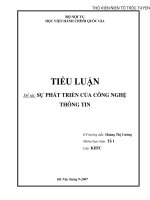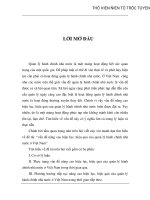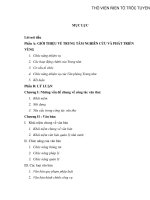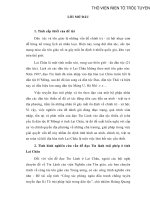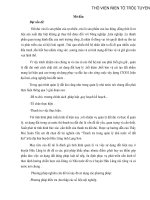KEYGCSE 213
Bạn đang xem bản rút gọn của tài liệu. Xem và tải ngay bản đầy đủ của tài liệu tại đây (74.03 KB, 5 trang )
SƠ GD&ĐT VINH PHUC
TRƯƠNG THPT LIỄN SƠN
(Đề thi gồm: 05 trang)
ĐỀ KSCL ÔN THI THPT QG NĂM HỌC 2019-2020
BÀI THI MƠN: TIẾNG ANH 213
Thời gian làm bài: 60 phút, khơng kể thời gian phát đề
Ho va tên thi sinh:……………………………………………………………………. SBD:…………………………
Mark the letter A, B, C or D on your answer sheet to indicate the word that differs from the
rest in the position of the main stress in each of the following questions.
Question 01. A. contain
B. purchase
C. reflect
D. suggest
Question 02. A. facilitate
B. dimensional
C. historical
D. instrumental
Mark the letter A, B, C or D on your answer sheet to indicate the correct answer to each of the
following questions.
Question 03. You frequently see this kind of violence on__________ television.
A. a
B. an
C. the
D. 0 (zero article)
Question 04. Please_________ your cigarette, I am allergic to smoke.
A. blow up
B. set aside
C. put out
D. turn off
Question 05. The small, __________ farms of New England were not appropriate for the Midwest.
A. self-supporting
B. self-supported
C. supporting themselves
D. they supported themselves
Question 06. The access__________ education and the change__________ economic status have given
women more freedom.
A. in / in
B. at / from
C. to / in
D. in / to
Question 07. He really deserved the award because he performed__________ what was expected of
him.
A. much better than B. much better which C. the most that
D. much more as
Question 08. __________ the phone rang later that night did Anna remember the appointment.
A. No sooner
B. Just before
C. Not until
D. Only
Question 09. Everything is__________ you. I cannot make__________ my mind yet.
A.out off / on
B. up to /up
C. away from / for D. on for / off
Question 10. __________ his brother, Mike is active and friendly.
A. Alike
B. Unlike
C. Dislike
D. Liking
Question 11. It was announced that neither the passengers nor the driver__________ in the crash.
A. are injured
B. was injured
C. were injured
D. have been injured
Question 12. I phoned the company, who__________ me that my goods had been dispatched.
A. guaranteed
B. assured
C. reassured
D. confirmed
Question 13. When the car was invented, I don’t think anyone could have predicted__________ it
would change the world.
A. how
B. when
C. why
D. what
Question 14. Dry salt lakes__________ 70 kilometers long and 15 kilometers wide lie__________ long
dunes__________ crests 20 meters high.
A. up to/ between/ with B. up with/ for/ to C. to up/ from/ for D. up to/ at/to
Question 15. He acted in an extremely__________ manner, which made him very unpopular.
A. dictatorial
B. dictate
C. dictation
D. dictatorship
Question 16. Have they__________ the "No Smoking" sign?
A. caught sight of
B. taken care of
C. put an end to
D. made fun of
Mark the letter A, B, C, or D on your answer sheet to indicate the most suitable response to
complete each of the following exchanges.
Question 17. Daisy: “What an attractive hair style you have got, Mary!” - Mary: “______________”
A. Thank you very much! I am afraid.
B. You are telling a lie.
C. Thank you for your compliment!
D. I don't like your sayings.
Question 18. Dick: “Sorry, Brian is not here.”
Peter: “____________________”
A. Would you like to leave a message?
B. Can I take a message then?
C. Can I speak to Brian, please?
D. Can I leave a message then?
Mark the letter A, B, C or D on your answer sheets to indicate the word (s) SIMILAR in
meaning to the underlined word (s) in each of the following questions.
Question 19. By the end of the storm, the hikers had depleted even their emergency stores.
A. greatly dropped B. lost
C. destroyed
D. used almost all of
Question 20. Originally the builders have me a price of $5,000, but now they say they
underestimated it, and now it’s going to be at least $8,000.
A. misjudged
B. underrated
C. undervalued
D. outnumbered
Read the following passage and mark the letter A, B, C or D on your answer sheet to indicate
the correct word or phrase for each of the blanks.
School exams are, generally speaking, the first kind of test we take. They find out how much
knowledge we have gained. But do they really show how intelligent we are? After all, isn’t it a fact
that some people who are very academically successful don’t have any common sense.
Intelligence is the speed (21)_________ which we can understand and react to new situations
and it is usually tested by logic puzzles. Although scientist are now preparing ( 22)_________
computer technology that will be able to “read” our brains, for the present tests are still the most
popular ways of measuring intelligence.
A person’s IQ is their intelligence as it is measured by a special test. The most common IT
tests are (23)_________ by Mensa, an organization that was found in England in 1946. By 1976, it had
1,300 members in Britain. Today there are 44,000 in Britain and 100,000 worldwide largely in the
US.
People taking the tests are judged in (24)_________ to an average score of 100, and those who
score over 148 are entitled to join Mensa. This works out at 2 percent of the population. Anyone
from the age of six can take tests. All the questions are straightforward and most people can
answer them if allowed enough time. But that’s the problem; the whole (25)_________ of the test is
that they’re against the clock.
Question 21. A. to
B. on
C. at
D. in
Question 22. A. ahead
B. upper
C. forward
D. advanced
Question 23. A. steered
B. commanded
C. run
D. appointed
Question 24. A. relation
B. regard
C. association
D. concern
Question 25. A. reason
B. question
C. matter
D. point
Read the following passage and mark the letter A, B, C or D on your answer sheet to indicate
the correct answer to each of the questions.
At 7 pm on a dark, cold November evening, thousands of people are making their way
across a vast car park. They're not here to see a film, or the ballet, or even the circus. They are all
here for what is, bizarrely, a global phenomenon: they are here to see Holiday on Ice. Given that
most people don’t seem to be acquainted with anyone who's ever been, the show's statistics are
extraordinary: nearly 300 million people have seen Holiday on Ice since it began in 1943; it is the
most popular live entertainment in the world.
But what does the production involve? And why are so many people prepared to spend
their lives travelling round Europe in caravans in order to appear in it? It can't be glamorous, and
it's undoubtedly hard work. The backstage atmosphere is an odd mix of gym class and workplace.
A curtained-off section at the back of the arena is laughably referred to as the girls' dressing room,
but is more accurately described as a corridor, with beige, cracked walls and cheap temporary
tables set up along the length of it. Each girl has a small area littered with pots of orange make-up,
tubes of mascara and long false eyelashes.
As a place to work, it must rank pretty low down the scale: the area round the ice-rink is
grey and mucky with rows of dirty blue and brown plastic seating and red carpet tiles. It's an
unimpressive picture, but the show itself is an unquestionably vast, polished global enterprise: the
lights come from a firm in Texas, the people who make the audio system are in California, but
Montreal supplies the smoke effects; former British Olympic skater Robin Cousins is now creative
director for the company and conducts a vast master class to make sure they're ready for the
show's next performance.
The next day, as the music blares out from the sound system, the case start to go through
their routines under Cousins' direction. Cousins says, 'The aim is to make sure they're all still
getting to exactly the right place on the ice at the right time - largely because the banks of lights in
the ceiling are set to those places, and if the skaters are all half a metre out they'll be illuminating
empty ice. Our challenge, ' he continues, 'is to produce something they can sell in a number of
countries at the same time. My theory is that you take those things that people want to see and
you give it to them, but not in the way they expect to see it. You try to twist it. And you have to find
music that is challenging to the skaters, because they have to do it every night.'
It may be a job which he took to pay the rent, but you can’t doubt his enthusiasm. 'They
only place you'll see certain skating moves is an ice show,' he says, 'because you're not allowed to
do them in competition. It's not in the rules. So the ice show word has things to offer which the
competitive world just doesn't. Cousins knows what he's talking about because he skated for the
show himself when he stopped competing - he was financially unable to retire. He learnt the hard
way that you can't put on an Olympic performance every night. I'd be thinking, these people have
paid their money, now do your stuff, and I suddenly thought, "I really can't cope. I'm not enjoying
it".' The solution, he realized, was to give 75 per cent every night, rather than striving for the sort
of twice-a-year excellence which won him medals.
To be honest, for those of us whose only experience of ice-skating is watching top-class
Olympic skaters, some of the movements can look a bit amateurish, but then, who are we to judge?
Equally, it's impossible not to be swept up in the whole thing; well, you'd have to try pretty hard
not to enjoy it.
Question 26. The word blares out in paragraph 4 is closest in meaning to_________.
A. seeps out
B. sounds beautifully C. resounds loudly D. rings
Question 27. What does the writer highlight about the show in the third paragraph?
A. the difficulty of finding suitable equipment
B. the need for a higher level of professional support
C. the range of companies involved in the production
D. the variety of places in which the show has been staged
Question 28. The word them in paragraph 5 refers to_________.
A. skating moves
B. skating competitions
C. things that people want to see
D. the skaters
Question 29. For Robin Cousins, the key point when rehearsing skating routines is_________.
A. keeping in time with the music
B. the skaters' positions on the ice
C. the movement of the lights
D. filling all available space on the ice
Question 30. What is meant by 'the hard way'?
A. through making a lot of errors
C. by misunderstanding the expectations of others
B. through difficult personal experience D. by over-estimating the ability of others
Question 31. What conclusion does the writer draw about Holiday on Ice?
A. It is hard to know who really enjoys it
B. It requires as much skill as Olympic ice-skating
C. It is more enjoyable to watch than formal ice-skating
D. It is difficult to dislike it
Mark the letter A, B, C or D on your answer sheet to indicate the word whose underlined part
differs from the other three in pronunciation in each of the following questions.
Question 32. A. changed
B. generated
C. geared
D. pleased
Question 33. A. speeches B. glasses
C. houses
D. parachutes
Read the following passage and mark the letter A, B, C or D on your answer sheet to indicate
the correct answer to each of the questions.
Before the 1500’s, the western plains of North America were dominated by farmers. One
group, the Mandans, lived in the upper Missouri River country, primarily in present – day North
Dakota. They had large villages of houses built close together. The tight arrangement enabled the
Mandans to protect themselves more easily from the attacks of others who might seek to obtain
some of the food these highly capable farmers stored from one year to the next.
The women had primary responsibility for the fields. They had to exercise considerable
skill to produce the desired results, for their northern location meant fleeting growing seasons.
Winter often lingered; autumn could be ushered in by severe frost. For good measure, during the
spring and summer, drought, heat, hail, grasshoppers, and other frustrations might await the wary
grower.
Under such conditions, Mandan women had to grow maize capable of weathering adversity. They
began as early as it appeared feasible to do so in the spring, clearing the land, using fire to clear
stubble from the fields and then planting. From this point until the first green corn could be
harvested, the crop required labor and vigilance.
Harvesting proceeded in two stages. In August the Mandans picked a smaller amount of the
crop before it had matured fully. This green corn was boiled, dried and shelled, with some of the
maize slated for immediate consumption and the rest stored in animal – skin bags. Later in the
fall, the people picked the rest of the corn. They saved the best of the harvest for seeds or for
trade, with the remainder eaten right away or stored for alter use in underground reserves. With
appropriate banking of the extra food, the Mandans protected themselves against the disaster of
crop failure and accompany hunger.
The woman planted another staple, squash, about the first of June, and harvested it near
the time of the green corn harvest. After they picked it, they sliced it, dried it, and strung the slices
before they stored them. Once again, they saved the seeds from the best of the year’s crop. The
Mandans also grew sunflowers and tobacco; the latter was the particular task of the older men.
Question 34. What is the main topic of the passage?
A. The agricultural activities of a North American Society
B. Various ways corn can be used.
C. The problems encountered by farmers specializing in growing once crop
D. Weather conditions on the western plains.
Question 35. The Mandans built their houses close together in order to__________.
A. share farming implements
C. protect themselves against the weather
B. guard their supplies of food
D. allow more room for growing corn
Question 36. Why does the author believe that the Mandans were skilled farmers?
A. They developed new varieties of corn. C. They developed effective fertilizers.
B. They could grow crops despite adverse weather.
D. They could grow crops in most types of soil.
Question 37. Which of the following processes does the author imply was done by both men and
women?
A. clearing fields
B. Harvesting corn C. Harvesting squash D. Planting corn
Question 38. The word “disaster” in paragraph 4 is closest in meaning to__________.
A. catastrophe
B. history.
C. control
D. avoidance
Question 39. The word “them” in the last paragraph refers to_________.
A. women
B. seeds
C. slices
D. the Mandans
Question 40. Throughout the passage, the author implies that the Mandans_________.
A. valued individuality
B. were very adventurous
C. were open to strangers
D. planned for the future
Mark the letter A, B, C or D on your answer sheet to indicate the underlined part that needs
correction in each of the following questions.
Question 41. Economists have tried to discourage the use of the phrase “underdeveloped nation and
encouraging the more accurate phase “developing nation” in order to suggest an ongoing process.
A. to discourage
B. the use
C. encouraging
D. the more
Question 42. Being the biggest expanse of brackish water in the world, the Baltic Sea is of special
interesting to scientists.
A. Being
B. in the
C. is of
D. interesting
Question 43. It is time the government helped the unemployment to find some jobs.
A. time
B. helped
C. unemployment
D. some
Mark the letter A, B, C, or D on your answer sheet to indicate the word(s) OPPOSITE in
meaning to the underlined word(s) in each of the following questions.
Question 44. Why are you being so arrogant?
A. humble
B. cunning
C. naive
D. snooty
Question 45. Strongly advocating health foods, Jane doesn’t eat any chocolate.
A. denying
B. impugning
C. supporting
D. advising
Mark the letter A, B, C, or D on your answer sheet to indicate the sentence that best combines
each pair of sentences in the following questions.
Question 46. Nobody is helping me, so I can’t finish my science project on time.
A. I could finish my science project on time if I were being helped by someone.
B. I needed help with my science project, but everyone just ignored me.
C. My science project will be difficult to do alone, so I should ask someone for help.
D. No one had time to help me, so I couldn’t finish my science project on time.
Question 47. He is very intelligent. He can solve all the problems in no time.
A. He was such intelligent he can solve all the problems in no time.
B. Such intelligent he is, that he can solve all the problems in no time.
C. He is very intelligent that he can solve all the problems in no time.
D. So intelligent is he that he can solve all the problems in no time.
Mark the letter A, B, C, or D on your answer sheet to indicate the sentence that is CLOSEST in
meaning to each of the following questions.
Question 48. I had no idea Clark spoke French until we went to Bordeaux.
A. I first realized that Clark knew French when we were in Bordeaux.
B. Before we went to Bordeaux, Clark had never tried to speak French.
C. While we were traveling to Bordeaux, Clark suddenly started to speak French.
D. It was difficult to understand the French that Clark was speaking in Bordeaux.
Question 49. One of the things I hate is noisy children.
A. I hate being in a place where there are noisy kids.
B. Children who make a lot of noise are terrible.
C. Among other things, I can’t stand children who make noise.
D. I hate both children and the noise they make.
Question 50. People who are unhappy sometimes try to compensate by eating too much.
A. Unhappy people are usually overweight because they tend to eat too much.
B. Eating too much occasionally makes people unhappy and depressed.
C. For some people, eating too much is a reason to be miserable.
D. When depressed, people occasionally attempt to offset their misery by overeating.
__________HẾT_________
